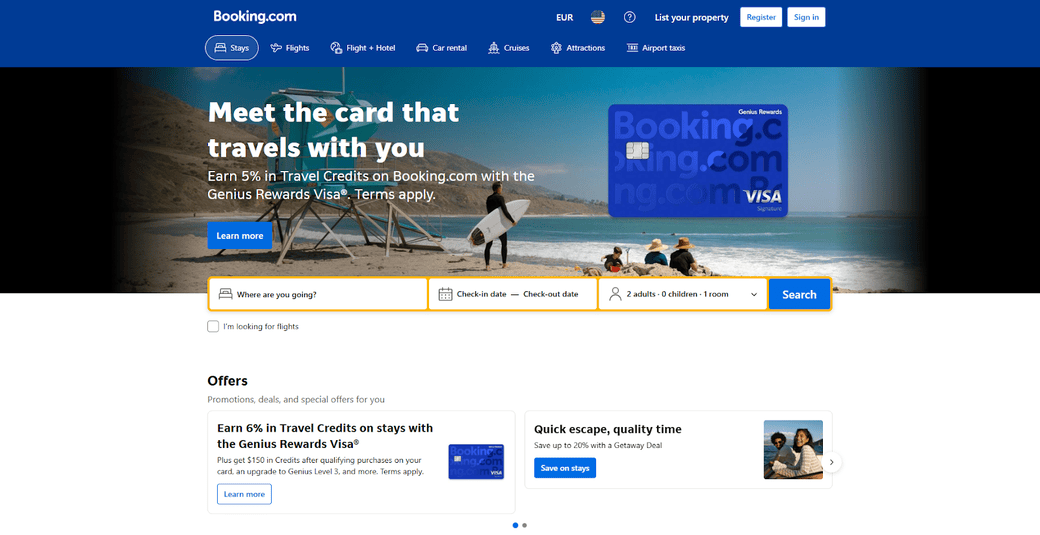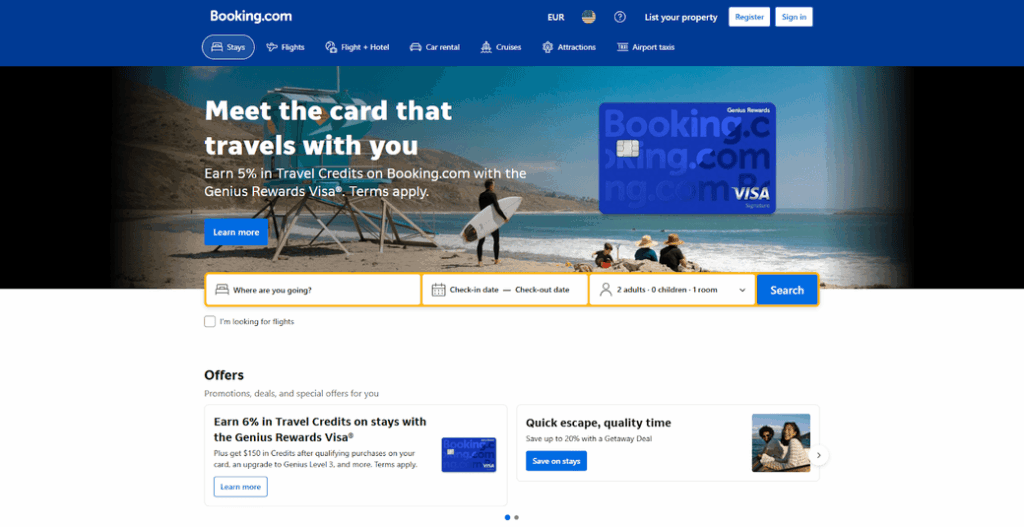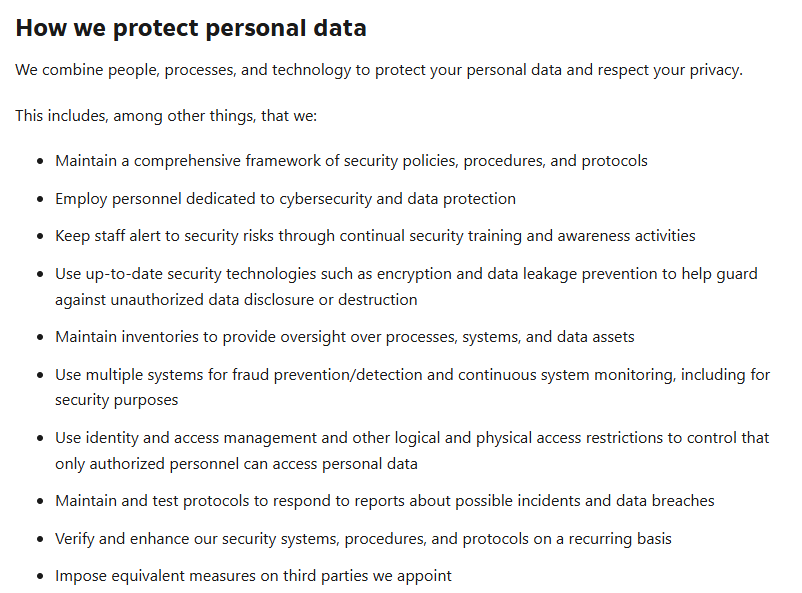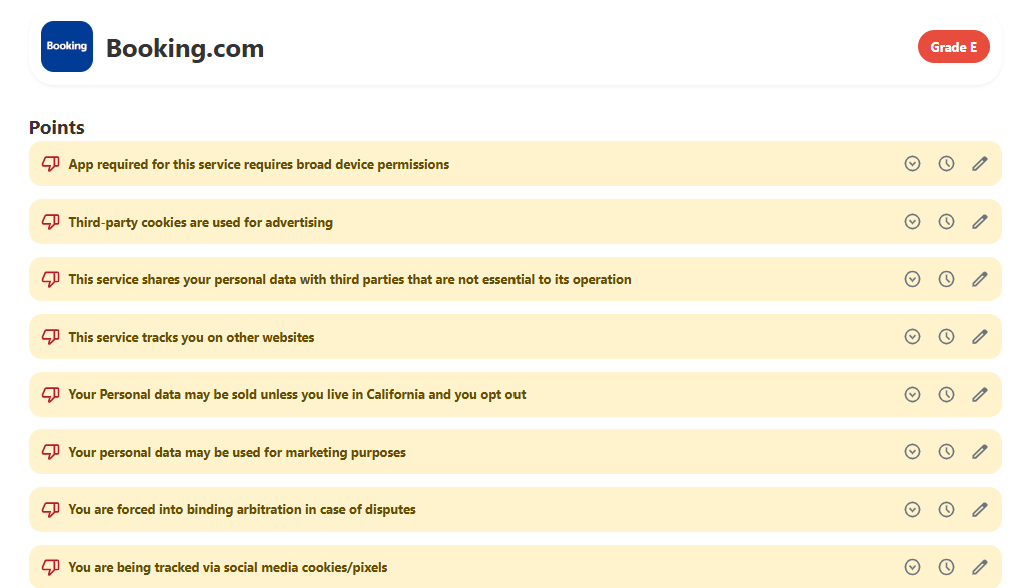Is Booking.com a Scam?
Laura Martisiute
Reading time: 9 minutes

Table of Contents
If you’re thinking of using Booking.com, you need to know if it’s safe. Is Booking.com a scam?
Below, we explain whether Booking.com is a scam and discuss some steps you can take to improve your safety when using this platform.
What Is Booking.com?
Booking.com is an online travel platform.

You can use the platform to search for and book places (e.g., hotels, hostels, apartments, etc.) to stay in. You can book flights, car rentals, airport taxis, and tourist attractions through the platform, as well.
Booking.com is a middleman, meaning that though you book through Booking.com, the reservation is fulfilled by the hotel/host, airline, or car rental company.
Is Booking.com a Scam?
No, Booking.com is not a scam. It’s a legitimate online travel platform.
User reviews of Booking.com are mixed:
- 2.2 out of 5.0 stars (from 96,572 reviews) on Trustpilot.
- 1.1 out of 5.0 stars (from 6,536 reviews) on ConsumerAffairs.
- 1.2 out of 5.0 stars (from 2,297 reviews) on Hello Peter.
- 1.2 out of 5.0 stars (from 4,257 reviews) on Sitejabber.
- 1.3 out of 5.0 stars (from 3,845 reviews) on ProductReview.
- 4.8 out of 5.0 stars (from 5m+ ratings) on Google Play.
On online forums like Tripadvisor and Reddit, people likewise report varying experiences.
For example, in a post titled “Do not book with booking.com,” a user said that Booking.com made it seem like they could cancel their booking up to arrival, but they ended up being charged the rental fee after they tried to cancel.
In response, multiple users said that it is each individual property, and not Booking.com, that sets the cancellation criteria.
Many noted that they’ve been using Booking.com for years and have had no issues.

Although some people recommend booking directly with a property to get the best rate, some users have found Booking.com’s prices to be better.
One person said: “I find booking.com to be very reliable. Yes, you should try and book direct if the price makes sense, but oftentimes, I have found the price on booking.com to be much better than going the direct route.”

The main disadvantage of booking through Booking.com versus directly with a property, according to many, is that if you have any problems, you’ll need to address them by going through Booking.com. As someone said, this is “one extra layer of hassles.”

And indeed, on ConsumerAffairs, multiple people complain about Booking.com failing to resolve issues they encountered.

Booking.com scams
As is the case with most major platforms, scammers love to impersonate Booking.com.
Deceptive Booking.com URLs
One of the most recent Booking.com scams involves criminals sending phishing messages with fake Booking.com links. The URL looks deceptively similar because criminals use characters like the Japanese hiragana “ん” instead of a slash (/). If a target clicks on the link, they are redirected to a malware download.
Fake Booking.com messages
Another popular scam involves criminals contacting users through Booking.com messages, email, or WhatsApp, claiming an urgent booking issue that requires immediate action, such as payment verification, to avoid cancellation.
Because these messages often come from compromised accommodation provider accounts, many users believe they’re legitimate and therefore do as the criminals ask.
Non-existent Booking.com accommodation
Some scammers go so far as to create fake listings for non-existent accommodation. A notable case involved an Australian CEO who arrived in Paris to discover her booking was for a property that didn’t exist.
This is quite a big problem. In 2024, Which? Travel investigated Booking.com after it found hundreds of recent reviews mentioning scams, where guests paid for accommodation that didn’t exist and then struggled to get a refund.
As part of the investigation, Which? submitted 52 suspicious listings to Booking.com, many of which were later removed, though Booking.com reportedly insisted that most of them were inactive properties rather than scams.
Which? reporters checked back months later and found 36 fraudulent listings still on Booking.com, some with hundreds of negative reviews from people who were scammed.
Booking.com anti-competitive practices
Booking.com has faced criticism and legal challenges over its anti-competitive practices.
In 2023, the State of Texas filed a lawsuit against it, alleging that the platform left out mandatory fees from the rates it advertised to make accommodation prices appear lower than they actually were.
In 2025, a landmark class-action lawsuit was filed against Booking.com by over 10,000 European hotels, looking for compensation for losses allegedly incurred over 20 years as a result of “best price” or “rate parity” clauses, which prevented them from being able to offer lower room rates on their own sites or on other platforms that were not Booking.com.
Booking.com Security
In its privacy policy, Booking.com lists the security measures it has in place for protecting your personal data.
It utilizes people, processes, and technology to safeguard your data, including cybersecurity personnel, up-to-date security technologies such as encryption and data leakage prevention, as well as fraud prevention/detection systems.

Booking.com Privacy
Booking.com describes the kind of data it collects, for what purposes, and with whom it shares it in its privacy policy.
It collects the following information:
- Data you provide: Name, email, address, phone, payment info, DOB, ID/passport details (when required), travel details (dates, preferences, companions, business travel info), reviews, photos, account settings, customer service interactions, and location if you grant access. Plus, geolocation data, inferences, and sensitive data (e.g., citizenship or immigration status, religious beliefs, and sexual orientation).
- Data about others: If you book for others, you may share their details.
- Automatically collected data: IP address, device/browser details, cookies, clicks, usage patterns, and app crashes.
- Data from third parties: Information from other Booking Holdings brands, trip providers, strategic partners, payment processors, marketing partners, and social media if you link accounts.
The company uses this data to administer and confirm bookings, payments, and online check-ins, as well as to provide support and manage bookings, save preferences, and enable easier future use.
It also uses it for marketing, communications, market research, service improvements, pricing display (based on your location/device), reviews, call monitoring, fraud prevention and safety, and legal purposes (e.g., resolve claims and comply with laws and law enforcement).
Booking.com may share your information with Booking Holdings group, trip providers, strategic partners, service providers, authorities (when legally required), and other business partners (e.g., insurance providers and auditors).
It retains your data as long as necessary for services, fraud prevention, legal compliance, and dispute resolution.

The company uses AI for fraud detection, personalization, recommendations, trip planning, and service improvements. AI decisions that significantly affect users are reviewed by humans (not fully automated). Data may be used to train AI models.
You have various privacy rights, including the right to access and delete your data.
Terms of Service; Didn’t Read (ToS;DR), a project that rates internet services’ terms of service and privacy policies, gives Booking.com a “Grade E.” This is the worst possible grade and means, “The terms of service raise very serious concerns.”
ToS;DR flags the following as issues:
- The app required for this service requires broad device permissions.
- Third-party cookies are used for advertising.
- This service shares your personal data with third parties that are not essential to its operation.
- This service tracks you on other websites.
- Your Personal data may be sold unless you live in California and you opt out.

On the plus side, ToS;DR notes that Booking.com provides information about how your personal data is used, and you can request access, correction, and/or deletion of your data.
So, Should You Use Booking.com?
Probably.
Just make sure to exercise caution. Double-check the property, read cancellation policies carefully, and consider booking directly with the property if the rate is the same (to simplify communication).
If privacy is a big concern, Booking.com may not be the best choice, as it collects and shares a significant amount of data.
How to Use Booking.com Safely and Privately
- Verify the property. Search for the property online to verify that it really exists, then look at photos and read reviews on multiple platforms (Tripadvisor, Google Maps, Airbnb). Listings with a small number of reviews or only 5-star ratings could be fake.
- Check cancellation and refund policies carefully. Policies are set by each property, not by Booking.com. If you might need to cancel, look for “Free cancellation” and double-check the exact cut-off time before booking.
- Pay securely. Always pay through Booking.com’s official platform, never through direct transfer. Also, consider using a credit card, which tends to give you stronger chargeback protections than debit cards.
- Be wary of phishing scams. Scammers are known to send fake Booking.com messages or emails, so always check the sender’s email and the website URL (https://www.booking.com). Don’t click on links that look suspicious.
- Take screenshots. Of your booking confirmation, cancellation terms, and any messages with the host to ensure you have evidence in case there’s a dispute.
- Limit how much data you share. Only share the required details and don’t upload IDs, passport scans, or personal preferences unless absolutely necessary. If booking for someone else, don’t overshare their details either.
- Use a separate travel email. Create a dedicated email address for accommodation and other travel-related bookings to reduce the amount of marketing spam that goes to your primary inbox.
- Opt out of marketing. In your Booking.com account settings, turn off promotional emails, targeted advertising, and partner data sharing.
- Use incognito/private browsing. Booking.com may use cookies to adjust prices based on your searches. Searching in the private/incognito tab can help you see unbiased rates.
- Check app permissions. If you use the Booking.com app, restrict unnecessary permissions (such as location tracking and contacts access).
- Don’t link accounts. Avoid linking Booking.com with other accounts, such as Facebook or Google. This can help you reduce how much data the platform collects about you.
Our privacy advisors:
- Continuously find and remove your sensitive data online
- Stop companies from selling your data – all year long
- Have removed 35M+ records
of personal data from the web
Save 10% on any individual and
family privacy plan
with code: BLOG10
news?
Don’t have the time?
DeleteMe is our premium privacy service that removes you from more than 750 data brokers like Whitepages, Spokeo, BeenVerified, plus many more.
Save 10% on DeleteMe when you use the code BLOG10.















